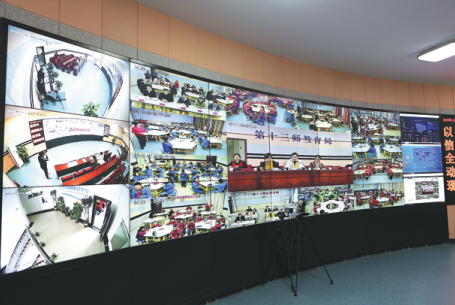Computers and the internet are opening up a world of online opportunities for students in Urumqi, Xinjiang Uygur autonomous region.
Students from the 104 Regiment Primary School of the 12th Division of Xinjiang Production and Construction Corps in Urumqi come every week to a high-tech classroom. Two screens are placed on the wall, as well as four cameras and six microphones on the ceiling. This modern environment, and net access, allows them to have an online class with teachers from Qingdao Zaoshan Primary School in Shandong province. With real-time connectivity they can hear and communicate with each other.
Since the project was launched in March, 11 schools in the division have joined, according to Feng Tianxiao, deputy director of the education bureau for the 12th Division of Xinjiang Production and Construction Corps.
"To balance education access for eastern and western China, teachers were sent to western provinces every year, which cost a lot in both financial and human resources. However, sometimes teachers who come west do not really meet the needs, thus, making it a waste of resources. To solve this problem, we introduced the online system," Feng adds.
Before a semester begins, teachers on each side will have online meetings to decide which classes can be shared with schools in Xinjiang and then set the schedule.
"The shared classes should begin at around 10 am, a time suitable for both sides," explains Hu Wenjiang, the headmaster of 104 Regiment Primary School.
During the class, teachers in Shandong can ask questions to students in Xinjiang and one or two local teachers will be present to help it run smoothly.
"To achieve continuous educational improvement, it is necessary to enhance local teachers' abilities," says Hu.
Sang Na, a Chinese teacher in the Urumqi school, says once a teacher in Qingdao Zaoshan Primary School used a Chinese shadow puppet in class. This inspired her a great deal as she realized the importance of creativity.
"Introducing traditional puppets in class not only makes the class more interesting, but also creates a chance to bring students closer to traditional culture," she says.
Sun Jiani, a fifth-grade student from the Urumqi school who takes part in the online class, relishes the experience. She especially likes the three-minute speeches delivered by her peers in Qingdao, saying that sharing has broadened her horizons and helped her to understand life in eastern China.
The project has now expanded from Urumqi to Hami.
According to Jiang Zongjun, director of the education bureau of the 13th Division in Hami, 12 schools in the division are scattered over an area of nearly 10,000 square kilometers.
In some rural places, a lack of teachers is always a problem. While this is being addressed, the internet is helpful, Jiang says.
"In the past, some of our teachers had to teach several subjects, but with the help of interactive online classes, they can focus on their own subject," says Jiang.
Yet, challenges remain. Li Zhiying, a teacher in Hongshan Farm School, says it took her some time to get used to the interactive system.
Usually, there are about 40 students in one class. But adding those online, teachers have to face nearly 500 students at the same time.
She recalls that at first, she rarely asked questions to students on the screen in front of her. Later, with guidance from other teachers, she had more interactions with students in other classrooms and could handle all the students at the same time.

